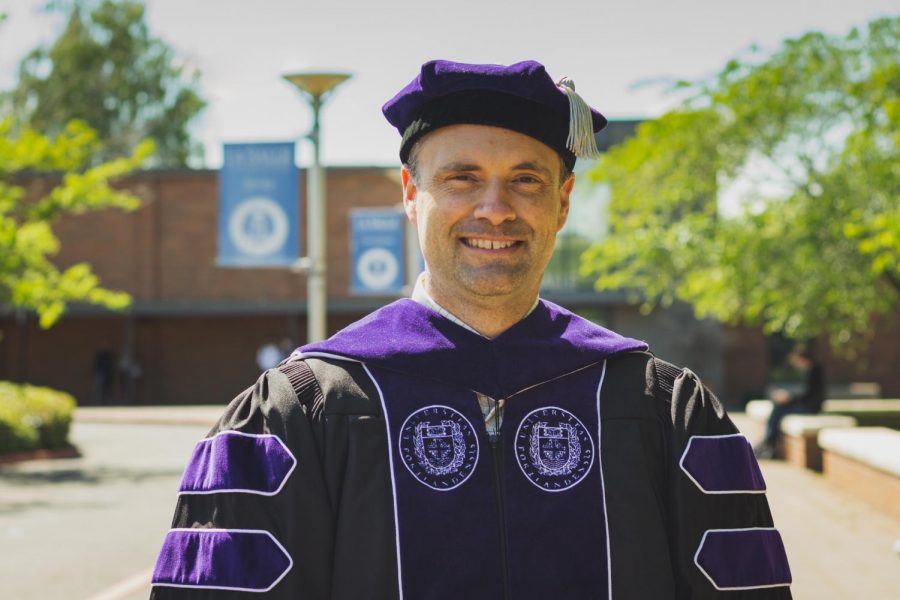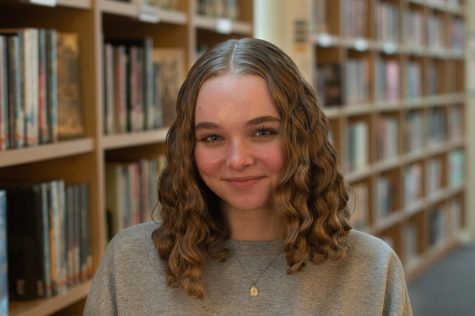Director of Faith Mr. Gary Hortsch Completes His Doctorate Degree, Gaining Valuable Insights on Religious Education
“I appreciate accompanying young people on their faith journey,” Mr. Hortsch said. “Seeing that process emerge of forming their own values, their own sense of identity, and grappling with the purpose of life is something that I just find incredibly satisfying.”
May 12, 2021
Like most La Salle students, religion teacher and Director of Faith Mr. Gary Hortsch sat through four years of religious studies classes from 9th to 12th grade, listening to his teachers at Regis High School lecture about Genesis and creation, teach about sacraments, and discuss Catholic social teachings.
Mr. Hortsch “deeply appreciated” his religious education, which remained with him for many years after high school. But as Mr. Hortsch went on to discover his vocation as a religion teacher and began teaching religious studies to high schoolers himself, one question around the religious education experience lingered in his mind.
“I always wondered, what would make the religious education classroom experience more impactful?” he said. “Over the years as an educator, I continued to wrestle with that question.”
When the opportunity arose for Mr. Hortsch to explore this area of curiosity, he took it. While completing his doctorate degree of Education in Leading and Learning at the University of Portland, Mr. Hortsch decided to focus his doctoral dissertation on the question that had prevailed for him throughout his career as a teacher.
For five years now, Mr. Hortsch has devoted most of his free time to studying and attending courses to obtain his doctorate degree, a graduate-level credential that symbolizes mastery in a certain area of study. He has concentrated the past three years on constructing his dissertation, the final step of his doctoral studies that entails writing a research paper based on data he has collected. Mr. Hortsch’s dissertation is titled “Listening to Graduates: An Evaluation of a U.S. Catholic High School Religious Education Program.”
“People ask me, where did I find the time to complete the dissertation, and I still don’t have a good answer to that — other than, every available opportunity to complete work over the last two and a half or three years has been dedicated to working on this project,” he said. “I couldn’t have done it without the support of my family, my brother John, and my wife in particular, who took care of various states that gave me the space to do that.”
The lengthy process of completing a dissertation resulted in many new understandings for Mr. Hortsch, and yielded conclusions that he has and will continue to apply to his work at La Salle.
As a first step in the formation of Mr. Hortsch’s dissertation, he collected responses from around 100 graduates of a Catholic high school, who provided feedback on their religious education programs. Following this part of his research, Mr. Hortsch conducted four focus group interviews with graduates from shared religious affiliation backgrounds, including backgrounds of Catholic, non-Catholic Christian, former Catholic, and no religious affiliation.
“One particularly interesting or exciting or insightful part of my research was having conversations with groups of people who share the same religious affiliation,” Mr. Hortsch said. “It was enriching to hear their shared stories of experience, because in the classroom as a teacher, I always hear them together in concert with each other… It really helped me understand perspectives that are different than my own.”
Numerous findings emerged from Mr. Hortsch’s experience listening to graduates speak about their religious educations, which he detailed in his paper. After finishing the dissertation, Mr. Hortsch noted several key takeaways from his study.
First, Mr. Hortsch said his research highlighted the importance of positive and inviting teacher-student relationships. “That really is the first step in successful religious education is that there is a trust and a strong relationship built between the teacher and the student,” he said. “Teachers really do make a big difference.”
Another takeaway from Mr. Hortsch’s work was that “young people pursue topics that are directly related to their lives,” he said. “Religious education at times can become abstract in thinking, but that young people from all religious affiliation patterns or conditionalities need to see the direct relationship between what they’re studying and how it impacts their lives and their values.”
Finally, Mr. Hortsch’s findings emphasized that “young people have questions, and sometimes they’re shy to ask or to engage,” he said. “But that really, the questions that emerge from the learner are what is most important.”
In terms of how Mr. Hortsch has transferred these findings from his dissertation to his role as an educator at La Salle, he said he sees his research as “confirming the shifts in our religious program for the last couple of years,” he said.
“As a department, we really sought ways to really connect more deeply with student experience and relating each level of study to contemporary issues, whether they’re justice issues or other moral topics,” he said. “So to me, it’s confirmation that we’re doing good work here.”
Mr. Hortsch said he will continue to apply his insights from his doctoral studies to his vocation as an educator as he progresses on his larger mission of helping students navigate their unique experiences with faith and religion.
“I appreciate accompanying young people on their faith journey,” Mr. Hortsch said. “Seeing that process emerge of forming their own values, their own sense of identity, and grappling with the purpose of life is something that I just find incredibly satisfying.”
Although connecting with graduates about their religious education was part of Mr. Hortsch’s research for his degree, this practice of his was not limited to his dissertation. Mr. Hortsch said he regularly keeps in touch with La Salle alumni, as he feels “really privileged to hear those stories, as well as to know that the work that is done here continues on to the years after,” he said.
As the past five years of Mr. Hortsh’s doctorate program came to a close and he prepared to graduate on May 9, he acknowledged that his “pursuit to improve religious education is a never-ending journey,” he said.
“I do believe that I gained valuable insights through earning a doctorate,” Mr. Hortsch said. “Former La Salle principal Tom Dudley once told me, ‘I wish every teacher had the opportunity to complete a doctorate.’ Now that I have done so, I am not sure that I would wish that amount of work universally on all teachers. However, the fruits of the labor are indeed great. In addition to gaining valuable insights about the field of religious education, I better understand the process of conducting an academic study.”
After having finally been able to explore his underlying question on the religious education experience, Mr. Hortsch is looking forward to continuing to grow as an educator and collaborating further with the team of religious studies teachers at La Salle.
“I don’t see this as a finish line,” Mr. Hortsch said, “but as a journey that continues on into deeper learning.”






Avery Rush • May 12, 2021 at 11:44 pm
Congrats Mr. Hortsch! It’s hard to find a teacher that cares as much about their students as you do